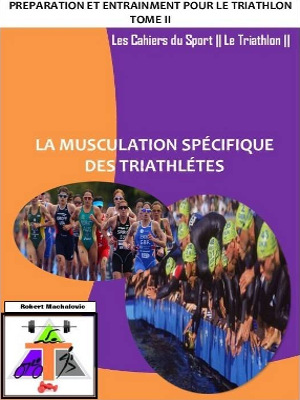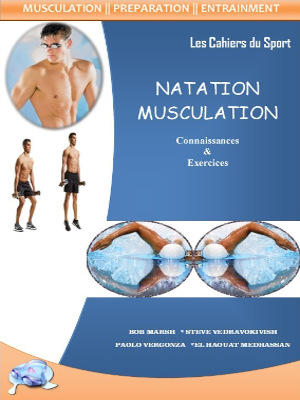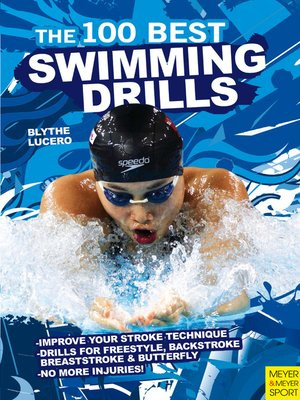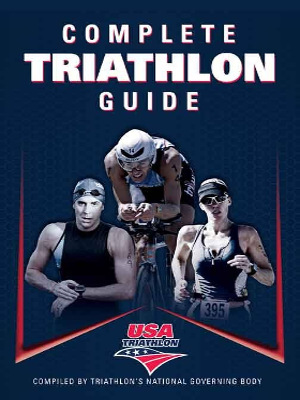 Triathlon has become the most popular multidisciplinary athletic event over the last decade, with competitions performed over a variety of distances, ranging from the triathlon 'sprint' (750m swim, 20k cycle ride, 5k run) to the gruelling Ironman, culminating in a marathon run. Unsurprisingly, therefore, a significant amount of new research is being devoted to investigating the determinants of successful triathlon performance.
Triathlon has become the most popular multidisciplinary athletic event over the last decade, with competitions performed over a variety of distances, ranging from the triathlon 'sprint' (750m swim, 20k cycle ride, 5k run) to the gruelling Ironman, culminating in a marathon run. Unsurprisingly, therefore, a significant amount of new research is being devoted to investigating the determinants of successful triathlon performance.
Most research to date has focused on the cycle-to-run transition, since significant correlations have been reported between cycling or running time and overall triathlon performance. The influence of swimming on subsequent cycling time has been relatively neglected.
However, a new study from France has demonstrated that swimming in drafting position can significantly improve subsequent cycling efficiency and might therefore be expected to improve triathlon performance in general.
The researchers had shown in a previous study that decreasing the metabolic load during a 750m swim by using a wet suit resulted in a 11% decrease in swimming heart rate and led to a 12% improvement in efficiency during a subsequent 10-minute cycling exercise when compared to swimming without a wet suit. The lower relative intensity when swimming with a wet suit is classically explained by a decrease in 'hydrodynamic drag' resulting from increased buoyancy.
Traditional high-volume model of training will not optimise performance
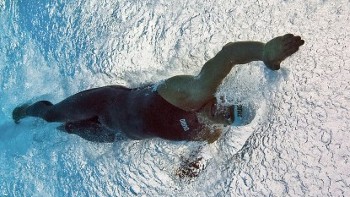 It is probably fair to say that most swimmers and swim coaches see the number of hours spent in the pool as the main ingredient of swimming success and distances of 6-10k per day are not uncommon in élite swimming circles. Is this really the key to success, or is there an alternative approach that can produce even better results? This article aims to stir up the debate by suggesting the traditional high-volume model of training will not optimise performance, especially for 100m and 200m swimmers. It is written not from a swimming coach's perspective but in the light of research on swim training, scientific analysis of the demands of competitive swimming, and running training methods that have been shown to optimise performance. Swimmers should read on with open minds and may then choose to apply some of the principles to their own training programmes.
It is probably fair to say that most swimmers and swim coaches see the number of hours spent in the pool as the main ingredient of swimming success and distances of 6-10k per day are not uncommon in élite swimming circles. Is this really the key to success, or is there an alternative approach that can produce even better results? This article aims to stir up the debate by suggesting the traditional high-volume model of training will not optimise performance, especially for 100m and 200m swimmers. It is written not from a swimming coach's perspective but in the light of research on swim training, scientific analysis of the demands of competitive swimming, and running training methods that have been shown to optimise performance. Swimmers should read on with open minds and may then choose to apply some of the principles to their own training programmes.
Plus...
Recreational swimmers don't think too much about the precise arm motion that maximizes efficiency and power. Most are simply trying to stay afloat and moving. But elite freestyle swimmers like Kara Lynn Joyce or Michael Phelps have long pondered the ideal technique. Some use what's called deep catch, pulling their arms through the water like a paddle. Others use sculling, which involves swinging the arms to the side like a propeller.
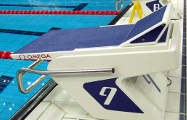 Olympic swimmers don't just dive into the pool like the rest of us. They start on a block called, appropriately enough, a starting block. London will see the Olympic debut of a track-style starting block with an inclined surface and a lip at the back.
Olympic swimmers don't just dive into the pool like the rest of us. They start on a block called, appropriately enough, a starting block. London will see the Olympic debut of a track-style starting block with an inclined surface and a lip at the back.
The blocks, first used in international competition at the Swimming World Cup in 2009, let swimmers push off from a crouch with the rear leg at a 90-degree angle, optimizing the power of their launch. The block also can detect false starts.
Why does that even matter to a physicist? Because it's all about acceleration.
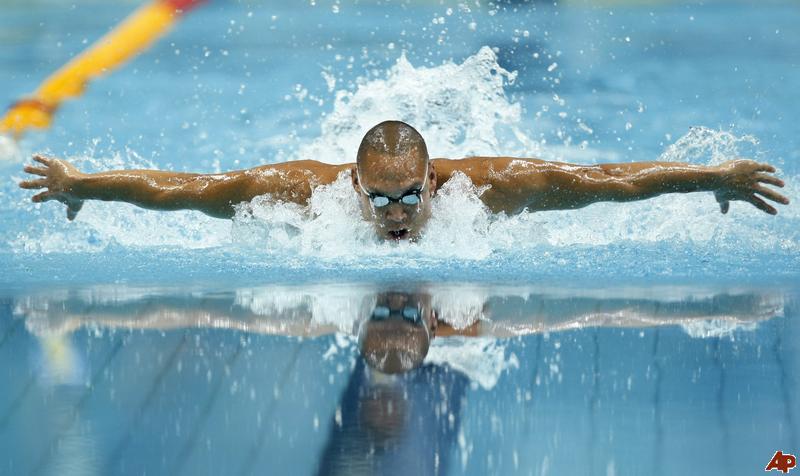 Unless appropriate paces and intensities of work are prescribed for individuals, some swimmers may under-work while others will overwork. The task is to prescribe optimal training activities which involve the correct mix of aerobic endurance, aerobic power, lactate tolerance, and sprint ability. Each of those forms requires different intensities, duration of repetitions, and rest intervals.
Unless appropriate paces and intensities of work are prescribed for individuals, some swimmers may under-work while others will overwork. The task is to prescribe optimal training activities which involve the correct mix of aerobic endurance, aerobic power, lactate tolerance, and sprint ability. Each of those forms requires different intensities, duration of repetitions, and rest intervals.
Sprint ability :
This is one's maximum velocity and is a function of muscle fiber type, level of creatine phosphate in the muscles, activity of creatine kinase in muscles, maximum muscle power, and neuromuscular recruitment patterns. A swimmer has to develop the skill of reaching maximum velocity as soon as possible in a race, to maintain maximum velocity for as long as possible, and develop the ability to call upon sprint ability in the middle and at the end of longer (>30 sec) races.
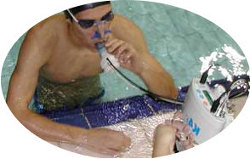 The usefulness of VO2 Max training has been a topic for a few years in the endurance sports world. At the elite athlete level, it is nearly impossible to train an improvement in VO2 Max, and it takes about 10 minutes of training for an athlete to achieve VO2 Max. Cyclists and runners have a large number of competitions that last longer than 10 minutes; swimming has very few. VO2 Max is also extremely difficult to test in the swimming population.
The usefulness of VO2 Max training has been a topic for a few years in the endurance sports world. At the elite athlete level, it is nearly impossible to train an improvement in VO2 Max, and it takes about 10 minutes of training for an athlete to achieve VO2 Max. Cyclists and runners have a large number of competitions that last longer than 10 minutes; swimming has very few. VO2 Max is also extremely difficult to test in the swimming population.
VO2 Max, or the Maximum Volume of Oxygen (O2) that can be consumed while breathing air during exercise at sea level, has always been difficult to measure for swimmers. Cyclists have stationary bicycles that can be precisely calibrated in laboratories while the riders are breathing into gas analyzers, and runners have treadmills, but none of this equipment translates very well to the pool. Many attempts have been made but they have failed to produce useful results. Coaches did what our country does best – improvise, trial & error, and repeat until they created what they felt to be the best approximation of VO2 Max training for their athletes.
 The purpose of training programs in swimming is to produce metabolic, physiological and psychological changes that allow swimmers to perform better in competitions. In swimming, as well as in other sports, aerobic endurance is one of the most important components of the physical fitness of swimmers, while VO2max represents the most objective measure for its assessment. VO2max refers to the maximum amount of oxygen that an individual can utilize during a one-minute exercise. Measurement of VO2max in swimming can be done in three ways, always using a method which is most similar to the swimming conditions during training and competitions. VO2max can be expressed in absolute and relative values, and in the case of elite swimmers ranges from 66 to 80 ml O2/kg/min. According to VO2max values, the work intensity in swimming can be optimized through exercise heart rate and subjective feelings of fatigue. Apart from VO2max, it is very important to measure the percentage of maximal oxygen uptake (%VO2max), which is the highest level of performance that an athlete can maintain over a longer period of time without becoming fatigued. In order to develop and increase VO2max, as well as other factors that influence the development of aerobic or cardio-respiratory endurance, it is advisable to take advantage of endurance training. This type of training can be divided into three levels: basic endurance training, anaerobic threshold endurance training and training above the anaerobic threshold. All three types of training influence the development of resistance, but it is considered that training at the anaerobic threshold is the most significant. Adaptations to training that increase maximum oxygen consumption can be divided into two groups; the first group increases the amount of oxygen that is supplied to the muscles, while the other increases oxygen utilization by the muscles. The latest studies presented in this paper indicate that the prediction of the results and success in swimming, according to the values of maximal oxygen uptake and the impact of training, will always be current in swimming. A single component of success in swimming is rarely the subject of research, in most cases it is usually an entire group of them. Therefore, the aim is to find and develop those factors (characteristics and capabilities) which contribute to the sport results of swimmers.
The purpose of training programs in swimming is to produce metabolic, physiological and psychological changes that allow swimmers to perform better in competitions. In swimming, as well as in other sports, aerobic endurance is one of the most important components of the physical fitness of swimmers, while VO2max represents the most objective measure for its assessment. VO2max refers to the maximum amount of oxygen that an individual can utilize during a one-minute exercise. Measurement of VO2max in swimming can be done in three ways, always using a method which is most similar to the swimming conditions during training and competitions. VO2max can be expressed in absolute and relative values, and in the case of elite swimmers ranges from 66 to 80 ml O2/kg/min. According to VO2max values, the work intensity in swimming can be optimized through exercise heart rate and subjective feelings of fatigue. Apart from VO2max, it is very important to measure the percentage of maximal oxygen uptake (%VO2max), which is the highest level of performance that an athlete can maintain over a longer period of time without becoming fatigued. In order to develop and increase VO2max, as well as other factors that influence the development of aerobic or cardio-respiratory endurance, it is advisable to take advantage of endurance training. This type of training can be divided into three levels: basic endurance training, anaerobic threshold endurance training and training above the anaerobic threshold. All three types of training influence the development of resistance, but it is considered that training at the anaerobic threshold is the most significant. Adaptations to training that increase maximum oxygen consumption can be divided into two groups; the first group increases the amount of oxygen that is supplied to the muscles, while the other increases oxygen utilization by the muscles. The latest studies presented in this paper indicate that the prediction of the results and success in swimming, according to the values of maximal oxygen uptake and the impact of training, will always be current in swimming. A single component of success in swimming is rarely the subject of research, in most cases it is usually an entire group of them. Therefore, the aim is to find and develop those factors (characteristics and capabilities) which contribute to the sport results of swimmers.
 Swimming is one of the oldest and basic motor skills of a human. Humans probably started to imitate animal movements (dog) to swim. There is a number of proofs which show how popular swimming was mainly in ancient Egypt, Greece and Rome. There are tens of proofs of the popularity of this sport in ancient Egypt. They are mainly statuettes or paintings on walls or vases which depict swimming humans. Sometimes, also swimming women are depicted which proves that it was one of the few sports from which women were not banned. Mainly the nobility were interested in having their children taught to swim because they took it as a part of education. There is a famous quote by Plato: "He cannot neither read nor swim." Swimming was also important in trainings of the Roman army – specially trained swimmers were used in naval battles. In Greek mythology, there is a tale about Leander who used to swim every evening to his lover Hera (and back in the morning) through the Dardanelles (approx. 1,500 m + strong current).
Swimming is one of the oldest and basic motor skills of a human. Humans probably started to imitate animal movements (dog) to swim. There is a number of proofs which show how popular swimming was mainly in ancient Egypt, Greece and Rome. There are tens of proofs of the popularity of this sport in ancient Egypt. They are mainly statuettes or paintings on walls or vases which depict swimming humans. Sometimes, also swimming women are depicted which proves that it was one of the few sports from which women were not banned. Mainly the nobility were interested in having their children taught to swim because they took it as a part of education. There is a famous quote by Plato: "He cannot neither read nor swim." Swimming was also important in trainings of the Roman army – specially trained swimmers were used in naval battles. In Greek mythology, there is a tale about Leander who used to swim every evening to his lover Hera (and back in the morning) through the Dardanelles (approx. 1,500 m + strong current).
In Rome, solders were taught to swim in Tiber River on the famous Campus Martius. They were swimming with clothes and weapons. A different chapter in history of swimming is Roman spa. However, swimming and water activities were also profaned in Rome. Apart from its purification function, Roman spa was associated with centers of vice. Gladiator water fights in a basin, so-called naumachia, can be regarded a complete downgrade of the idea. Some aspects of Roman spa had a negative influence on the perception of swimming, bathing and hygiene in general by the Christians. In the Middle Ages, human body was perceived as the tool of the Devil. Clean complexion was said to mean dirty soul. Only few people did refresh themselves in rivers or ponds. This prudery was eased only in the period of humanism. But still at that time, Comenius warned against swimming in the open air. Only further development of the society brought a change in the opinion on bathing and swimming.
S'inscrire Pour Accéder à la Totalité du Site
Conseils Sports Coaching Formation

